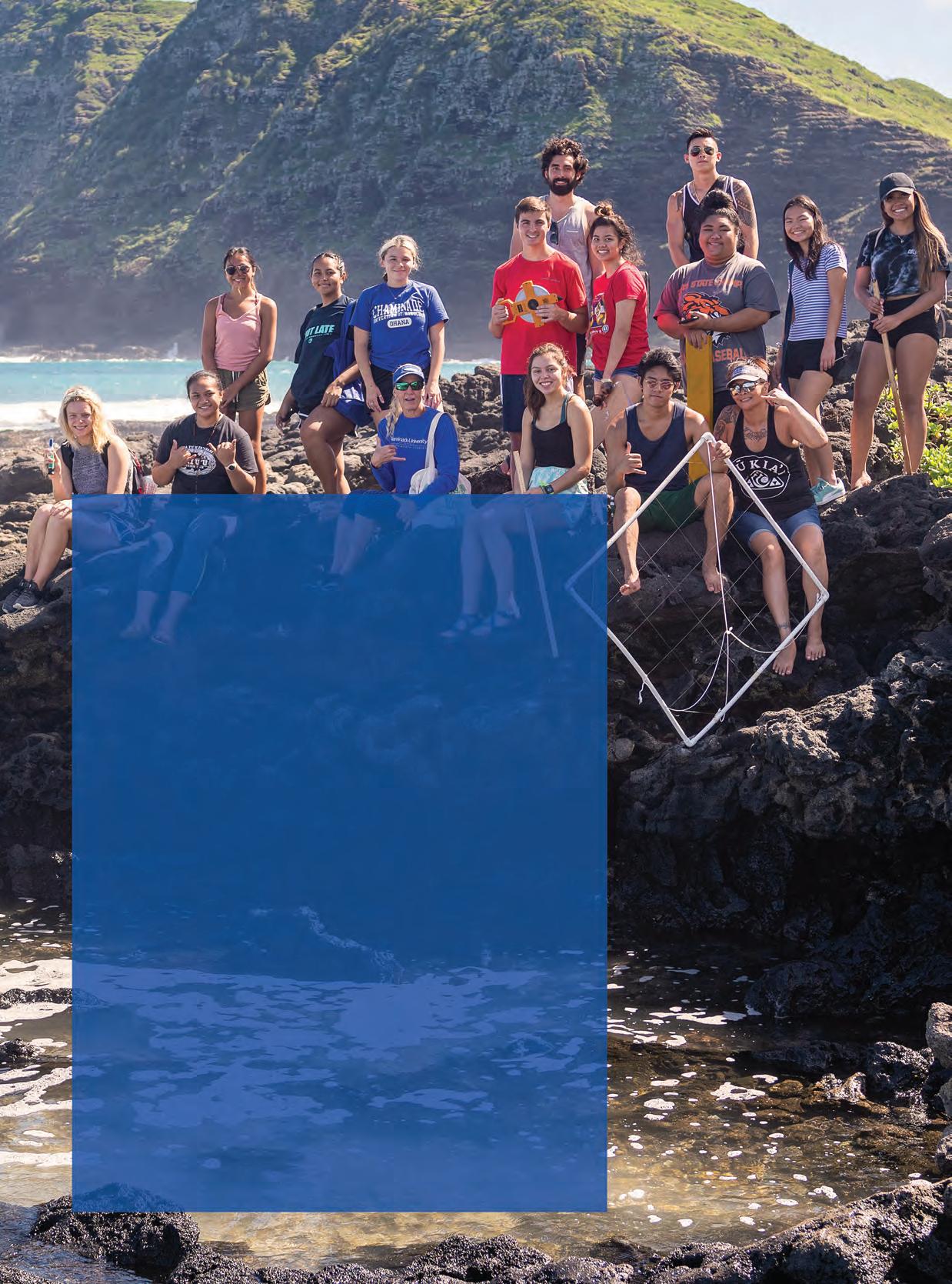
MAGAZINE PRESENTS COLLEGE GUIDE2023 Finances · Pre pa r i n g in High School · Surviving College · Important Test Dates · Advice From a Recent College Grad GOOD LUCK ! DOOGKCUL ! YO U GOT THIS!
PUBLISHER
SCOTT SCHUMAKER
ASSOCIATE PUBLISHER DONNA KODAMA-YEE
EDITORIAL DIRECTOR DIANE SEO
EXECUTIVE EDITOR KATRINA VALCOURT
PROJECT EDITOR
EMILY SMITH
CREATIVE DIRECTOR
JAMES NAKAMURA
SENIOR ART DIRECTOR CHRISTINE LABRADOR
STRATEGIC PARTNERSHIPS
MICHELLE STOFLE
ADVERTISING EXECUTIVE DONNIE FORD
ADVERTISING PROJECT MANAGER PUI-HENG TANG
CLIENT RELATIONSHIP SPECIALIST JANELLE YOU
WRITTEN, DESIGNED AND PUBLISHED BY
The College Guide is published as a supplement to HONOLULU Magazine, October 2022. ©2022 by PacificBasin Communications, 1088 Bishop St. Suite LL2, Honolulu, HI 96813.


photos and illustrations: courtesy of chaminade university, courtesy of hawai‘i pacific university, getty images; opposite page: courtesy of hawaiiusa federal credit union, getty images

2 | 2023 COLLEGE GUIDE P. CG 04 Financial Wellness P. CG 06 A Local Kid’s Guide to Surviving College P. CG 08 Preparing for College in High School P. CG 10 Getting Into College P. CG 18 Timeline to Success P. CG 22 Advice From a Recent College Grad ON THE COVER PHOTO AND ILLUSTRATIONS: COURTESY OF HAWAIIUSA FEDERAL CREDIT UNION, GETTY IMAGES
2023 COLLEGE GUIDE contents
A

HawaiiUSA Federal Credit Union
Aloha!
When it comes to momentous steps in life, an important and impactful one happens fairly early along life’s journey—the start of one’s college career. All the studying, all the homework and tests, it has all led you to this celebratory moment in time! But as exciting as your pursuit of a higher education can sound, there may be times when you find yourself facing difficult questions, especially those that revolve around personal finances and money.
We want to help guide you through all the uncertainty.
HawaiiUSA Federal Credit Union has partnered with HONOLULU Magazine to bring you the 2023 College Guide, a resource for both parents and students for navigating through the common questions that may come in the college planning process, which can be applied and used right from the start.
At HawaiiUSA, serving our members and local communities to help them reach their financial dreams has been our lifelong commitment. We’re a credit union founded on helping Hawai‘i’s educators, and we have a deep-rooted relationship with the Hawai‘i Department of Education. We know how influential the right education can be for the student, their family, and their extended community.
We hope this year’s College Guide inspires you to do great things for your future! With thoughtful planning, we have no doubt you will succeed in life, both on and off-campus. Congratulations on your many achievements past, present, and in the future.
 Mahalo nui loa, Greg Young PRESIDENT & CEO HAWAIIUSA FEDERAL CREDIT UNION
Mahalo nui loa, Greg Young PRESIDENT & CEO HAWAIIUSA FEDERAL CREDIT UNION
How will I pay for college? Which one should I choose? Get answers to these questions and more: GoHawaiiGrad.com HawaiiUSA in partnership with HACAC
 Greg Young
Greg Young
MESSAGE FROM
2023 COLLEGE GUIDE | 3
Financial Wellness
IF COLLEGE IS IN YOUR CHILD’S FUTURE, PLANNING IS KEY. And, after the past three years of a pandemic in which many of us lost jobs or experienced unexpected financial setbacks, it’s especially important for you to make smart money choices. Here’s what the experts at HawaiiUSA FCU have to say about starting off on the right financial foot, for your child’s education and your family’s financial well-being.
BY MARIA KANAI
SIT DOWN AND TALK FINANCES AS AN ‘OHANA
It’s never too late to have a transparent conversation about finances with your chil dren. Involving them, even at a young age, makes it a team effort. Talk about basic financial literacy skills and be open about your general financial picture, as this will guide their day-to-day living when they go to college.
Make sure your children understand how credit cards work—if that’s a tool your family would like to utilize—and why it’s important to have a good credit score. If they’re planning to work through college to help with expenses, talk about the differ ences between a checking and savings account and how to use them. Follow up with a quick visit to HawaiiUSA FCU to open up accounts for your children.
BRAINSTORM WAYS TO SAVE MONEY IN COLLEGE
Your conversation with keiki should focus on setting financial priorities for when they actually start college. You can do this by creating a college-life budget together with your kids. A financial coach at HawaiiUSA FCU can help with that. Creating weekly meal plans and researching student discounts are good places to start. Other mon ey-saving ideas include carpooling, using the bus instead of driving a car and borrow ing books from the library instead of buying from the college bookstore. Also, splitting family memberships for things like Costco, Disney Plus, Netflix and Amazon Prime can help as well.
Experts at HawaiiUSA Federal Credit Union offer some tips as you send your child to college.
for college:
4 | 2023 COLLEGE GUIDE
preparing
illustrations: getty images
KEEP TRACK OF YOUR MONEY
You’ll need to keep track of your kids’ spending to make sure they’re meeting their monthly budgets. HawaiiUSA FCU and other financial institutions have digital banking, which gives real-time updates on your accounts, including your debit and credit cards. And the HawaiiUSA mobile app connects to other bank and credit card accounts so you can see all of your financ es in one place.
RESEARCH COLLEGE SCHOLARSHIPS & GRANTS
This should be an obvious step. The coronavirus rescue package that passed in 2020 included emergency relief for higher education to help ensure learning continues during the pandemic. By March 11, 2021, $39.6 billion had been distributed. You can stay up to date by visiting www2.ed.gov.
Another option to look into is HawaiiUSA FCU’s $2,000 college scholarship. You’ll need to be a primary HawaiiUSA member for at least 12 consecutive months prior to applying, be in good standing, and be enrolled as a full-time student during the
upcoming academic school year. Prior recipients of the scholarship can reapply. The application period is from December through February.
To increase your child’s chances of earning college scholarships, make sure they have a professional online presence as colleges may look them up online. Start early and get involved with the community, apply for schol arships that are only available to local students rather than the whole country, and don’t ignore scholarships with smaller financial awards as they often have smaller pools of applicants.
EXPLORE ALTERNATE OPTIONS
Even after federal assistance, scholarships and grants, college tuition can still be a lot to take on. If you’re an eligible home owner, opening a home equity line of credit, or HELOC, can be an option to help with tuition and other college-related expens es. Here’s how it works:
With a HELOC, you can borrow against the equity in your home. The home serves as collateral for the loan and approved borrowers can withdraw funds from a predetermined credit line to pay for expenses like college tuition, books and more. Pros of a HELOC include lower interest rates, repayment on the amount borrowed (not the entire credit line at once), a onetime application and a manageable payment schedule.
PARTNER WITH YOUR LOCAL BANK
Let’s face it—it’s easy to worry when you’re a parent, especially if your child is moving away from Hawai‘i for college. Using a trusted local institution like HawaiiUSA FCU allows you to continue your credit union membership on the mainland through shared branching, other credit union branches, ATMs and co-op ATMs.
FINANCIAL CHECKLIST FOR FAMILIES
1 Start a joint bank account with your child. If you’re still supporting your keiki financially, it’s a good idea to have a joint account so you can deposit mon ey easily and monitor spending activity and balances.
2 Get a debit card. This way, your child will have convenient access to his or her checking account and can utilize tools like spending alerts and budgets.
3 Set up digital banking. Keeping a budget requires track ing and managing your money. With digital banking, you can get online statements, easily transfer money and keep a close eye on your child’s spending. Your child can also deposit checks online (think birthday money, part-time work or graduation checks) and utilize security features such as blocking and reporting a card if it’s lost or stolen.
4 Load your children’s debit cards to payment apps. Make it easier for them to shop at the college bookstore, eat at the caf eteria or hail a ride via a mobile wallet.
5 Consider a credit card. If you feel your kids are ready and have a good grasp of how financ es work, you can get them each a credit card to start building their own credit now.
6 Leverage available resources to help your child monitor and understand the factors that impact their credit score, such as My Credit Score powered by SavvyMoney® and available as part of HawaiiUSA’s digital banking and mobile banking app.
2023 COLLEGE GUIDE | 5
A Local Kid’s Guide to Surviving College
Tips to stay on top of academics, money and more.
BY CASSIDY KEOLA, SHINAE LEE, EVE HUDDLESTON AND EMILY SMITH
CLASSES
1 Meet with your adviser every semester. The saying “five to graduate” is real. Before choosing your classes, make sure that you meet with your adviser so they can help you build a schedule that will allow you to graduate within four years.
2 Before signing up for classes, check ratemyprofessors.com. Profes sors can often make or break a class and your GPA, so it is helpful to see what previous students have had to say.
3 Take your general education courses first. It is not uncommon for students to change majors throughout college. However, the last thing you want to do is lose money while doing that. To give yourself time to figure out what you are passionate about, fulfill your general education requirements first.
4 Remember to check not just the times, but also lo cations. If you have back-toback classes across campus from each other, will you make it? And remember, Ha wai‘i kid, if snow is involved, it could take you longer to get there.
5 Interested in studying abroad? It might be difficult to find classes that meet your major requirements abroad, so save some of your core requirements to take abroad instead. It might be best to study abroad in your soph omore year so that you get acquainted with college life before switching to another new campus.
Getting Around
• Research public transporta tion. Bus or metro passes are often included in a university’s student fees.
•
Split rides with friends. Riding by yourself in an Uber or Lyft can be expensive and sometimes sketchy, so travel in groups.
• Search areas near your school for free parking. Parking on campus might be convenient, but it can be costly, so if you’re commuting from far away, drive to areas like mall parking lots or safe neighbor hoods nearby. Just be sure to give yourself enough time to go the rest of the way.
•
Depending on the size of your school, you may want to invest in a bike or skateboard to shave off minutes when getting from one class to the next.
6 | 2023 COLLEGE GUIDE
illustrations: getty images SCHEDULING
GOT THIS!
WORKING PART-TIME
• Search the school’s job database. Campus jobs usually hire for the next year or semester, so more crop up near the end of term.
• Check your emails regularly. Your school will send you emails regarding exclusive internship and job opportunities, so make sure to check them and apply to all your desired positions.
•
Look for “help wanted” signs on and off campus. Go on a walk downtown and keep your eye out around campus. Some jobs might not be posted online.
• Walk into places where you want to work and ask if they’re hiring. Bring your résumé and leave it with them in case of an opening.
• If all else fails, the dining hall is usually an easy place to get hired as a student.
GEARING UP
1 If you’re heading someplace cold, it’s best to buy winter jackets there to save money and space in your suitcase. Plus you can see what the others kids are wearing.
2 In many places, it will get dark around 4 p.m. during the winter. So consider buying a sun lamp to fight those dark afternoons and seasonal depression.
3 Be the cool kid from Ha wai‘i with all the ‘ono Hawai‘i snacks—Spam, furikake popcorn, li hing mui sour belts—and a rice cooker. Spread da aloha.
4 If you’re lucky you’ll get a twin XL in your dorm, but most likely you’ll be stuck with a twin bed. Either way, college dorm beds are not comfortable. A mattress pad, however, is an easy fix.
5 Buy an extension cord. Your dorm will most likely be small with one outlet.
6 Depending on your dorm regulations, consider purchasing a microwave and air fryer. This way you can save money by mak ing your own food and ditch the unhealthy options of eating out.
BUYING BOOKS
• Don’t go to the campus bookstore first! While it’ll be your No. 1 resource for school swag, the books are almost always pricier there.
• To clarify what books will be used in your class, contact your professor. Email them before the class starts so you have enough time for your books to come in.
• BookFinder.com is an incredible online resource—it compares prices of new and used books from more than 100,000 sellers, so you can be sure you’re getting the best deal.
Money Tips
Download an app such as Venmo or Cash App. Every time you go out to eat with friends, come across a campus fundraiser or just need to pay your roommate for toilet paper, various apps and some banks let you do it instantly, so you can request and send money from a bank account. Also, Unidays is a website that allows college students to get exclusive discounts on subscriptions, clothes, technology and more. Be sure to sign up with your college email to save some coin. myunidays.com
• Buying used textbooks is cheaper; plus you may find useful notes to help you ace the test. (Think of it as a free personal tutor.)
• Check Amazon for textbook rentals. Anyone with a school email address can start an Amazon Prime Student account for half the usual membership price, which comes with free two-day shipping and access to free movies and music. (Amazon also offers a sixmonth free trial.)
2023 COLLEGE GUIDE | 7
SURVIVING COLLEGE
YOU
Preparing for College in High School
BY KATHRYN DRURY WAGNER AND EMILY SMITH
CHESS CLUB. MOCK TRIAL. THE SCHOOL NEWSPAPER. CHINESE CLUB. VOLLEYBALL. Sign up for it all! Not so fast. It’s not the number of activities students do in high school that counts, experts say. Think quality over quantity. “And whatever you choose, do it consistently,” says Amy Prince, a school counselor at Southampton High School, in Southampton, New York. “It’s what you’re engaged with actively. Somebody might do 40 hours of community service, but was it 40 hours over one week during a church mission, and the oth er 51 weeks of the year they did nothing?” Compare that to a student who volunteers with, say, Best Bud dies, helping people with developmental disabilities, once a week, all year.
“When students can demonstrate they have had consistent involvement and that they are leaders within the organizations, we get excited about their potential to contribute positively on our campus,” says Mark Cortez, director of Outreach and Recruit ment at The Ohio State University. “This doesn’t have to just be school activities; we want students to think broadly about experiences like community opportunities and/or work experiences. They each add something a little different and that is what we consider.”
CONNECT THE DOTS
Students should seek out areas where they can take on leadership roles. “That doesn’t always mean being the president of a club or its founder,” says Prince. “What events did you organize? If you’re just listing on your application that you were a member—what does that mean to an admissions officer? Define your role. Now, in ninth or 10th grade, there aren’t a lot of leadership roles but, if you stick with it, if you rise up to captain or co-captain in an athletic setting, or trea surer or president in a group; this shows the qualities colleges are seeking within their own school’s population.”
Schools can tell from a mile away when an applicant is trying to build a résumé out of nothing, grabbing onto 15 random activities. If, on the other hand, a student is involved with Model UN and student government and Girls Learn In ternational, the school can see a pattern and a purpose.
According to Prince, students should use ninth and 10th grade for experimen

A student’s involvement sets the foundation for college acceptance—and beyond. Here’s how to build that foundation with strength and purpose.
8 | 2023 COLLEGE GUIDE photo and illustrations: getty images
GOO D LUC K ! OOGDCUL K !
tation, to find out what they are most interested in, and then home in. Re member that “colleges and universities have seniors graduating and need to fill leadership roles or spark something new,” Prince points out. For an athletic program, they may need a new quar terback; for an orchestra, a new cellist. “It’s not like they put an ad out: ‘Hey, we need a cellist,’ but it’s part of the thought process,” she says. “I think one of the reasons I got into the college I did, York College of Pennsylvania, was that I had been a DJ for a high school radio station and they had a radio station that needed a manager.”
CHOOSING COURSEWORK
Even though AP coursework is a great opportunity, again, think quality over quantity. Consider your strengths and your goals. For example, someone inter ested in engineering might not want to take AP literature, but, instead, explore an engineering program, even without an AP label attached to it. “Schools are
trying to figure out: What drives the student?” says Prince. “If you want to be pre-med, and haven’t done well in science or math, maybe that’s not a realistic goal. That’s a student who is going to change major.” Think about classes that are genuine passions, things that can extend into interests in college. Otherwise, Prince warns, “students become machines of cranking out grades and don’t find what resonates with them.”
STRONG ESSAYS
Most schools require students to submit supple mental essays with their application, which can be a way for college admission officers to decipher whether you will be a good fit at their university. This is especially important now, as many schools are loosening their SAT requirements and taking a more holistic approach when reviewing applica tions. Recent graduates recommend focusing on telling the admissions officer about yourself, espe cially outside of academics.
FINISHING STRONG SENIOR YEAR
Students should avoid giving in to senioritis, or play ing what Prince calls “a game of academic chicken.” That’s when seniors try to find the line of how little effort they can put in. “It’s not a good game to play,” she says. “If you were a 90 student, you should stay a 90 student, even in senior year. Schools are still watching.” There is some wiggle room, of course. For example, if a student is challenging himself or herself with AP physics, he or she might not get a 90, and schools will understand that.

Your senior year will also be the time when colleges see if your grades have shown consistent growth. This upward trend gives grace to those who might not have gotten the highest grades but have improved over time.
“We encourage students to stay in a foreign language, and recommend electives. It’s free in high school!” says Prince. “Electives cost a lot of money in college. Take advantage. A lot of the AP and honors-level kids haven’t gotten to take a lot of electives.”
Last, remember that being engaged doesn’t stop after college acceptance. “Once they get on campus we expect that students will be actively involved, as doing so contributes to their social and academic success,” says Cortez. “As students work to discover their passions in college, they are doing this with [other] students who are diverse in majors, experi ences and backgrounds. This discovery stage leads to rich experiences where students can learn from those around them and, in most cases, benefit.”
2023 COLLEGE GUIDE | 9
PREPARING FOR COLLEGE IN HIGH SCHOOL
Getting Into College
 BY DIANE SEO
BY DIANE SEO
THIS!
SATS NO LONGER REQUIRED






The biggest change in college admissions has been the rise of test-optional policies. Once deemed mandatory, submitting SAT, ACT and other standardized test scores is now optional at more than 1,800 schools, including many of the country’s most prestigious universities, says Todd Fleming, director of college counseling at ‘Iolani School.
To be clear, it wasn’t the pandem ic that instigated the change—it just sped up the timeline. Schools for years had been considering deemphasizing standardized testing, acknowledging its
STRATEGIES FOR COLLEGE ADMISSION HAVE SIGNIFICANTLY SHIFTED SINCE COVID-19 ROCKED THE WORLD. While schools still seek out students with stellar academic credentials and glowing teacher recommendations, the pandemic pushed institutions across the country to scrap standardized testing requirements, roll out virtual campus tours and more.
As policies have changed, so have tactics for gaining admittance. We spoke with a local col lege counselor and one who works with students nationwide about the shifting landscape, seeking their insights and advice for today’s college-bound students and their families.
limitations in evaluating students and the inequity of some students being able to afford test prep courses while others could not.
Thus, when COVID-19 struck, and SATs and ACTs were canceled, colleges swiftly announced that students were no longer required to submit standardized test scores. The ability to opt out led to record numbers of applications at many selective schools—and lower acceptance rates. Suddenly, students who didn’t have test scores that met school averages were emboldened to apply.
Although some institutions, including the Mas sachusetts Institute of Technology, have announced that applicants once again will be required to submit SAT/ACT scores, many have gone the opposite route. None of the nine University of California campuses, for instance, will consider SAT and ACT scores in admissions or scholarship decisions. Other schools are following suit.
In deciding whether to submit standardized test scores to places where they are optional, students should evaluate their individual situations, counselors say.



“If a student has access to take a test, then they should do so. And if they do well, they should submit their scores because it’s another metric, another measure of their academic preparation for college,” says Connie Livingston, a former admissions

Having an informed, personalized strategy is critical for college admission, especially since the pandemic.
10 | 2023 COLLEGE GUIDE
illustrations: getty images
YOU GOT
officer at Brown University who now serves as a counselor at the California-based college consultancy Empowerly. “As a former admissions officer, in some instances, I did value being able to see those test re sults, particularly for STEM fields. If I saw high math scores and the student was applying to an engineering program, for example, that was valuable and con firmed their preparedness.”
Fleming agrees, saying ‘Iolani’s counselors still strongly encourage students to prepare for and to take standardized tests. “The beauty of test-option al is that students can look at a school and decide whether or not to submit their scores,” he says. “They can ask themselves, ‘Do these scores repre sent me well? And do I believe they will assist me in my application to this particular college?’”
MORE FINANCIAL CONSIDERATIONS
Along with changing admission requirements, students and their families have been wrestling with more financial considerations as college costs rise and economic uncertainties grow.
“I think students and families are now consid ering more variables than they have in the past,” Fleming says. “They might be looking more now at not just what they’re going to be asked to pay, but how much they would be comfortable paying. It’s always been a huge issue for most families in the United States, but discussions of paying for college are probably more common than they used to be.”
Fleming says another change he’s noticed is that selective schools—but perhaps not the most selective ones—are less predictable in terms of how they distribute merit aid. “We’re seeing merit packages that we wouldn’t have necessarily expected in the past,” he says. “It’s a college’s acknowledgment that this is a great student. We’d love to have them on our campus, and we’re willing to have this family at a lower price point to do that.”
MORE STUDENTS ARE APPLYING EARLY
Another trend in college admissions, although not necessarily driven by the pandemic, is that more students are taking advantage of early decision and early action programs because acceptance rates are often higher, Livingston says.
There’s an important distinction to make, howev er, between early decision and early action. While early decision is a binding agreement—you must at tend if you’re admitted—students applying through early action can choose other schools.
“You should only apply early decision if you know beyond a shadow of a doubt that this is your top choice school,” Livingston says. “I also caution students where finances could be an issue, because when you receive your early decision ad mission, you will likely receive your financial aid package, and 100% of your needs may not be met.
Upcoming Dates
October 1
FAFSA forms become available. The online FAFSA application must be submitted by 11:59 p.m. Central time on June 30, 2023. However, many colleges will require this earlier. Complete the CSS Profile to find more scholarship options.
November
Hawai‘i Community Foundation opens its scholarship application process. Check hawaiicommunity foundation.org for updated deadlines.
February/March
The deadline for financial aid applications at most colleges.
March/April
Many colleges send out acceptance letters during this month.
May 1
Many colleges require that you reply with your intent to enroll by this date.
Not all families are able to take that financial risk.”
Another thing to note for early applicants is that because of the early deadlines—typically in November—ad missions officers likely will analyze them through their junior years instead of their senior years.
RISE OF VIRTUAL CAMPUS TOURS
During the height of the pandemic, with institutions veering to remote learning and campuses shutting down, college tours came to a halt. Schools across the nation began offering more virtual tours of their facilities and programs. “It’s a
2023 COLLEGE GUIDE | 11
GETTING INTO COLLEGE
Crunching the Numbers at UH M noa (2022–2023 School Year)
$11,304
In-state tuition (includes Native Hawaiian nonresi dents, active duty military and other exemptions)
Nonresident tuition $16,956
Western Undergraduate Exchange rate
Pacific Island Exemption rate
very positive thing that has come out of the pandemic that so many more schools have shored up their online resources for students,” Livingston says. “Before, you had the traditional in-person campus vis it, which isn’t accessible for all students. Now, there are either live or recorded in formation sessions along with live Q&As and chats with current undergraduate students. Students can now go to college websites and take advantage of virtual online opportunities that can give them a thorough idea of what their life and
educational experience would be like.”
For Hawai‘i students, the convenience of the virtual tour is clear.
“Not all of our families or students are able to travel and visit colleges,” Fleming says. “That’s a stark contrast to kids going to high school in the Northeast where they can hop in the car and visit five or 10 different selective colleges within a week. So when colleges were forced to offer more online, that allowed our students to avail themselves to additional resources that didn’t exist prior to the pandemic. There’s no replacement for actually being on campus, but it did help.”
“Bring It On!”
TOM NITAO | Sophomore, Rice University
TOM NITAO WAS IN THE MIDST OF HIS JUNIOR YEAR AT PUNAHOU WHEN COVID-19 STRUCK, dramatically disrupting his and other students’ lives. With pandemic restrictions still in place, the 19-year-old began his senior year that fall, assuming the helm as class president.

It was hardly a typical year, with countless school activities and traditions revamped or canceled. Applying to college also was starkly different. For one thing, SATs and ACTs were now optional at schools across the country.
But as he explained in his commencement speech, he and his classmates rose above the challenges. “In a year that was defined by distance and sacrifice, only an
unshakeable class could end it in arms together,” he told his classmates. “And while most people would end it here by saying something like, ‘Get ready for us, world,’ I’ve got a new message: ‘Bring it on.’”
When it came to selecting a college, Nitao focused on what was important to him. “I’m always open to trying new things,” he says. So he was comfortable with venturing far from home, even to parts of the country that Hawai‘i college-bound students typically haven’t flocked to. And since middle school, he’s had his sights set on business. (His dream job is to become a general manager in the NFL.)
While researching competitive universities with presti gious business programs, he learned about Rice University in Houston and its equally strong campus culture. He ap preciated that students took on leadership roles in multiple ways, and he was impressed with how the school admin istration navigated through the pandemic, disseminating information in a transparent way and adopting restrictions to protect students. (With high-risk family members, stay ing safe during COVID is a priority for Nitao.)
After enrolling at Rice in the fall of 2021, he, like many other college students, attended hybrid classes his first year. It wasn’t ideal, but again, he was thankful that Rice was taking pandemic precautions.
Nitao advises students just starting the college applica tion process to do their research. “Google the college you are interested in and find the student leadership,” he says. “This is a simple yet effective way to get the perspective of students at your desired school.” —Emily Smith
COLLEGE
12 | 2023 COLLEGE GUIDE
$33,336
$16,956
CONTINUED ON PAGE CG 14
JOURNEYS photo and illustration: courtesy of tom nitao, getty images GETTING INTO COLLEGE





TELL YOUR STORY
The normal flow of schooling changed for many students during the pandemic. Remote learning became the norm, grad ing systems shifted, and sports and other extracurricular activities were canceled or postponed. Admissions officers are fully aware of this and want students in their personal essays to indicate how they’ve been affected by the changes and how they’ve adjusted.
Fleming says the student essay has always been a critical component of a college application, but it’s clear now that a person’s story should not be solely defined by their activities. “A person’s story could encompass something from their own history, from their family, from something more than a rehashing of their activities list,” he says. “The pandemic perhaps forced students to see that they need to show colleges more of who they are and what makes them tick. The essay has always been the vehicle for that, and students now recognize that their essay isn’t just an activities listing, but a chance to reveal who they are.”
DON’T FOCUS ON RANKINGS
Overall, Livingston advises college applicants and their families to not be consumed by rankings. Schools should be selected based on how good a fit they are for them. “What the rankings do is establish prestige, and students and families want to be associated with prestige,” she says. “It’s hard to change that mindset, but I try to explain to students that this is going to be your home for the next four years, your community. Dig deep into what a particular college community
College Disrupted
JOEY COOTEY
Senior, Portland State University
COLLEGE HAS BEEN VASTLY DIFFERENT FROM WHAT JOEY COOTEY EXPECTED after arriving at Portland State University in the fall of 2019. In March 2020, the Hawai‘i Island native, like college students around the globe, returned home because of the pandemic.

The 21-year-old spent the rest of her freshman year and her entire sophomore year attending classes virtually from her Waimea home, a setup she describes as isolating and difficult. “It was really confusing at first. I had just gotten used to all my classes, going to school in person and collaborating with my classmates,” says Cootey, a graduate of Kamehameha Schools on Hawai‘i Island. “They tried their best with creating breakout rooms on Zoom, but it’s not the same as sitting next to classmates and doing projects together. COVID totally changed the way I did college.”
Cootey returned to Portland State for her junior year, and although half of her classes were still online, she’s grateful for even the limited face-to-face contact with students and pro fessors. “It’s definitely nice to sit in a classroom and see my professor and talk to my classmates,” she says. “I personally prefer in-person school.”
Majoring in public health, she is looking to become a phy sician’s assistant and eventually return to Hawai‘i to work in an underserved rural area.
Her tip for high school students as they consider colleges: Make sure you pick a place where you can do things outside of school. She chose Portland because she loves both city life and the outdoors. “Base your college choices on passions in and out of school,” she says.
Cootey is also glad she considered her family’s finances when she applied to college. One of the main reasons she chose Portland State was because of the lower tuition com pared to larger universities. She said she’s paying about half of what she would have paid at other schools she had been considering.
And finally, she urges applicants to stay organized during the process. “Start writing essays early, have a calendar with all the deadlines and keep a folder with all your materials,” she says. —Diane Seo
photo and illustration: courtesy of hawai‘i pacific university, getty images
COLLEGE JOURNEYS
14 | 2023 COLLEGE GUIDE
GETTING INTO COLLEGE CONTINUED FROM PAGE CG 12 CONTINUED ON PAGE CG 16

can offer you, and what you can offer them.”
There are about 4,000 colleges in the United States, and the vast majority offer excellent educational and social extracur ricular opportunities, she adds.
“It’s incredibly important for stu dents to build a balanced college list,” she says. “You want to have some safety schools, target schools, reach schools, and maybe even a few of those high reaches, like the top 10 schools. But it’s important that every school on your list is one that you would be happy to attend, where you can see yourself thriving and excelling. Safety schools should not just be a place to go if you don’t get in anywhere else. You should be excited to attend them too.”
Fleming said his main advice to students is to think critically about what experiences they’re hoping to get from college, and to identify that in a way
that’s not contingent on what others want or what they’ve heard but on what school will fit them best.
“We ultimately want them to find a place where they will be challenged, but they’ll also be successful,” he says. “We want them to be comfortable, but not too comfortable. We want them to grow. It’s the next four years of their life that can create amazing opportunities for them for the rest of their life.”
GOT THIS!
As the owner of Fairypotz, a small ceramics and crochet business on Depop and Instagram, Lancaster was drawn to UH’s strong business program, which she hopes will help her expand her business. Ultimately, she’s hoping for a career in real estate.
Missed Connections
ANGIE LANCASTER
Junior, University of Hawai‘i at M noa
NOW HALFWAY THROUGH COLLEGE, Angie Lancaster can’t help but feel the pandemic has denied her and her classmates the full college experience. After graduating from Mililani High School in May 2020 (in a drive-thru graduation ceremony), she decided to attend college at the University of Hawai‘i at Mānoa. Even prior to the pandemic, the 19-year-old chose to continue her schooling in Hawai‘i to save mon ey and be close to her family.


Like with many other students, the pandemic was rough on Lancaster, especially on the social front. A social butterfly, she had been greatly looking forward to meeting new people at college. But with COVID cases still rampant during her first year, she decided to live at home instead of moving into a dorm. She believes attending classes online also prevented her from making meaningful connections.
Lancaster eventually moved into a dorm during her sophomore year and started attending at least some in-person classes, paving the way for her to make new friends.
Now, she says she’s trying to live in the moment and remain positive about her future, but that COVID and the current state of the economy have taken a toll. “I am hopeful that by the time I graduate within two years, there will be more jobs available, and the market will be better,” she says. —Emily Smith
photos and illustration: courtesy of touro university, courtesy of angie lancaster, getty images
COLLEGE
16 | 2023 COLLEGE GUIDE
CONTINUED FROM PAGE CG 14
YOU
JOURNEYS GETTING INTO COLLEGE







2023 COLLEGE GUIDE | 17 With a low student-faculty-ratio, we o er students individualized attention and expert faculty. Our students develop critical skills, including problem-solving, communication, and team-building, to prepare them as leaders now and well into the future. • *Guaranteed Scholarship and Admission Program for Hawaiʻi high school Class of 2023. • Opportunities in 41 di erent Undergraduate Programs and 19 Graduate Programs. • Graduates who make positive impacts in their workplaces and communities. • Global experiences through more than 400 approved Study Abroad options in more than 70 di erent countries. Aloha, Pono and Kuleana are the values of Hawaiʻi Pacific University. We prepare graduates to live, work and learn as members of a global community. Our innovative programs empower students to fulfill the growing needs of a changing world. • The only Doctor of Physical Therapy program in Hawaiʻi (launched in the 2022-23 academic year). • HPU’s Military Campus Programs support the Armed Services and Veterans Communities. • Classes located at Downtown Honolulu, Hawaii Loa, and at the Oceanic Institute and Center for Marine Debris Research in Makapuʻu. * Qualifications needed. 1 Aloha Tower Drive (808) 544-0200 Toll Free +1 866-CALL-HPU hpu.edu Hawaiʻi Pacific University is the Top Choice for Students.
Timeline to Success
Finding and getting accepted to the right college or university is actually a four-year process. That may sound daunting, but take each step one at a time and stay organized, and you’ll be fine. Here’s how to manage the road to college admission:
9th GRADE 11th GRADE
12th GRADE 10th GRADE
Enroll in challenging classes.
Keep grades up. Get involved in extracurricular activities.
Explore potential career paths.
Set up a college savings plan.
Develop good timemanagement skills.
Try some AP classes.
Take a practice Preliminary SAT/National Merit Scholarship Qualifying Test (PSAT/ NMSQT). Juniors qualify to compete for the National Merit Scholarship Program, but younger students can take it for practice. collegeboard.org/ psat-nmsqt
Consider volunteering during the summer.
Visit campuses while traveling, just to get a sense of what type of college appeals to you. Small? Big? Public? Private?
In October, take the PSAT/NMSQT (this year, it’s Oct. 12, 15 and 25).
Sign up to take the ACT or SAT. Colleges usually accept either one, but check with where you’re interested. Many students will take the test once as a junior and again as a senior. Is it worth taking it twice? According to ACT, 57% of 2015 graduates increased their Composite score on the retest.
Visit campuses if possible.
Attend college fairs and network with the college representatives.
In the fall, repeat the ACT/SAT tests. Send in scores.
Gather teacher and other personal recommendations. Send thank yous afterward!
Narrow down the list, but have at least four to eight schools to apply to.
Draft your essay. Leave enough time for at least two people to read it and comment.
Check all due dates at the colleges you want to attend; they vary by institution and you don’t want to miss anything.
18 | 2023 COLLEGE GUIDE
illustrations: getty images
TIMELINE TO SUCCESS







 PHOTO CREDIT: JOSE MAGNO
PHOTO CREDIT: JOSE MAGNO
MANOA.HAWAII.EDU
The University of Hawaiʻi at Mānoa is an equal opportunity, affirmative action institution. At the University of Hawai‘i at M anoa, we give you the tools to follow your dreams with a choice of 99 different majors, 87 graduate majors, 52 doctoral degrees, and 5 first professional degrees. Begin your journey with us! For undergraduate admissions, visit manoa.hawaii.edu/admissions For graduate admissions, visit manoa.hawaii.edu/graduate Wherever you want to go, we can help you get there. #TakeMeToManoa
Standardized Tests
The nationally administered SAT tests reading, writing and math and is used to test how ready a student is for college. SAT Subject Tests and the optional SAT Essay are no longer offered by College Board. For more, go to sat.collegeboard.org/home
Registration deadlines are typically a month ahead of the test, with late registration a week or two before the test. SAT dates this year are
as follows: Oct. 1, Nov. 5, Dec. 3, March 11, May 6, June 3. satsuite. collegeboard.org/sat/registration/ dates-deadlines
If you have been tested for dyslexia or attention deficit hyperactivity disorder or believe you may qualify for accommodations such as extra time, visit accommodations. collegeboard.org to learn more.
ACT
The ACT is a national college admissions exam that includes En glish, math, reading and science questions. The ACT Writing Test includes a 40-minute essay, which is required by some colleges and not others. In Hawai‘i, the state picks up the cost of taking the ACT for all public school juniors. To register, visit act.org
DO





bring a current photo ID issued by a city/state/ federal government agency or the high school, as well as printed test ticket and approved calculator.
DON’T bring a cell phone, smart watch or even a fitness tracker to an SAT test; they are prohibited. ACT test sites allow phones if they are turned off and placed out of reach.
noa, getty images
photo and illustrations: getty images; opposite page: courtesy of university of hawai‘i
Amazing happens here.
The University of Hawai‘i Community Colleges o er a variety of a ordable associate degree and certi cate options that will prepare you for your future right here at home. Apply today with our quick and free application at kamaaina.hawaii.edu.
De ne your path. Discover your future. Make it happen.
 Hawai‘i | Honolulu | Kapi‘olani | Kaua‘i |
Leeward | Maui | Windward
Hawai‘i | Honolulu | Kapi‘olani | Kaua‘i |
Leeward | Maui | Windward
m Ā
1907
APPLY NOW
20 | 2023 COLLEGE GUIDE TIMELINE TO SUCCESS
Use a site like myscholly.com to sniff out scholarship opportunities. Scholly requires a subscription, ranging from $4.99/month to $34.99/year.
GATEWAY TO YOUR FUTURE
Hawai‘i Tokai International College is an accredited two-year college in Kapolei that offers an internationally oriented liberal arts education. Students can meet new people, broaden their horizons, and discover new pathways to peace. After earning an A.A. degree, many graduates successfully transfer to baccalaureate colleges and universities in the U.S. and Japan.



Upcoming ACT Test Dates
October 22
Register by September 16; late registration until September 30
December 10 Register by November 4
February 11
Register by January 6
April 15
Register by March 10
June 10 Register by May 5
July 15 Register by June 16
KAPOLEI, HAWAI‘I
91-971 FARRINGTON HIGHWAY • KAPOLEI, HI 96707 • ADMISSIONS@TOKAI.EDU • HTIC.EDU
2023 COLLEGE GUIDE | 21 TIMELINE TO SUCCESS
Advice from a Recent College Grad
How to set yourself up for success.
BY EMILY SMITH
IN MAY 2022, I GRADUATED SUMMA CUM LAUDE FROM THE UNIVERSITY OF HAWAI‘I AT MĀNOA. I enjoyed the comfort of being a student, but I’m excited for my future because I know I worked hard. I got good grades, took advantage of internship opportunities, and made connections with professors that ended up easing my emotions and even helped me finish college ear ly, in just three years. Post-graduation life is going well too: I’m interning full-time with HONOLULU Magazine and am set to attend the University of Southern California to get my master’s degree in communication management. Here are some steps I took in college that can help lower the stress of graduating into the real world.

Look out for internship opportunities. Let’s face it, what makes college priceless is not neces sarily the education, but the opportunities that it presents. I was amazed to see how many companies would ask UH to blast their internship posts to stu dents. With how challenging it is to get a job, taking advantage of internship opportunities is a great way to give yourself some leverage.
I Zoomed into my first internship with a public relations company. My palms were sweaty, not knowing what to expect. My goal was to add a bul let point to my résumé. On the first day I was given the responsibility of creating graphics, handling certain posts and drafting captions for social me dia. And I soon realized that internships are about more than just building a résumé. They’re about building skills.
Get to know your professors. Shy and timid before college, I was the student who would walk with my head down and sit at the back of the class. This mental wall cost me the connections I could
have made with my professors during my freshman year. However, in my sophomore year I realized that I would inevitably need an academic recom mendation letter. In English class, we were learning about Associated Press style, and I had a lot of questions. I emailed my professor multiple times, and hopped onto Zoom calls with her, too. Through this, she got a sense of who I am and my work ethic. A year later, I started applying to graduate schools, and she was more than willing to write my recom mendation letter, which helped me get accepted to all the universities I applied for.
Take notes on a laptop during lectures. This seems like a no-brainer; however, you would be surprised at how many students sit at the back of the classroom on their phones or chatting with their friends. Taking notes will help you ace that test and keep your grades up. In my first semes ter of college I took an American Studies class, which consisted of 1 ½-hour lectures. Originally, I brought my trusty colored pens and notebook to take color-coordinated notes. But after the first 30 minutes, my hands were in excruciating pain from trying to keep up with the professor’s slideshow. I switched over to my computer. It was easier to keep up that way, and painless as well. By the time finals rolled around, I had about 50 pages of notes that I could study from, which ended up paying off on my final exam.
College is what you make of it. If you put in the work, you will get results, and if you do not, you might lose sight of what you are really there for. Anxiety and uncertainty are unavoidable, but you can take steps to ease your angst and ensure suc cess. Take it from me, a recent graduate. And make the best out of every opportunity.
photo and illustrations: courtesy of emily smith, getty images
22 | 2023 COLLEGE GUIDE
STUDENT TO STUDENT

































































2023 COLLEGE GUIDE | 23

























24 | 2023 COLLEGE GUIDE SUPPORTING EDUCATION IS OUR TRADITION Let us support yours 20 scholarships $2,000 each High school seniors, undergraduate, and graduate students See qualifications and apply EXPERIENCE MEMBER ONLY BENEFITS hawaiiusafcu.com/ meet Money and independence: get the tools to make it happen Chat with our team for 1:1 advice hawaiiusafcu.com/ scholarship
